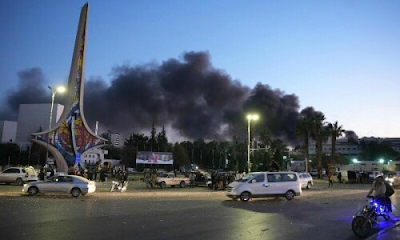As the commander of Al Qaeda’s franchise in the Syrian civil war, Abu Mohammed al-Golani was a shadowy figure who kept out of the public eye, even when his group became the most powerful faction fighting President Bashar al-Assad.
Today, he is the most recognisable of Syria’s triumphant insurgents, having gradually stepped into the limelight since severing ties to Al Qaeda in 2016, rebranding his group and emerging as the de facto ruler of rebel-held northwestern Syria, says report in Pakistani newspaper 'Dawn'.
The transformation has been showcased since rebels led by Golani’s Hayat Tahrir al-Sham (HTS), formerly known as the Nusra Front, swept through the nation and declared they had ousted Assad on Sunday after seizing the capital.
Golani has featured prominently in the takeover, sending messages aimed at reassuring Syrian minorities who have long feared the rebels.
“The future is ours,” he said in a statement read on Syria’s state TV, urging his fighters not to harm those who drop arms. When the rebels entered Aleppo, pre-war Syria’s largest city, at the start of their sweep to Damascus, a video showed Golani in military fatigues issuing orders by phone, reminding fighters to protect the people and forbidding them from entering homes.
He visited Aleppo’s citadel accompanied by a fighter waving a Syrian revolution flag: once shunned by Nusra as a symbol of apostasy but recently embraced by Golani in a nod to Syria’s more mainstream opposition.
Before founding the Nusra Front, Golani — whose real name is Ahmed al-Sharaa — had fought for Al Qaeda in Iraq, where he spent five years in a US prison. He returned to Syria once the uprising began, sent by the leader of the Islamic State group in Iraq at the time — Abu Omar al-Baghdadi — to build up Al Qaeda’s presence.
The US designated Golani a terrorist in 2013, saying that Al Qaeda in Iraq had tasked him with overthrowing Assad’s rule and establishing Islamic sharia law in Syria, and that Nusra had carried out suicide attacks that killed civilians and espoused a violent sectarian vision.
Turkey, the Syrian opposition’s main foreign backer, has designated HTS a terrorist group while supporting some of the other factions that fight in the northwest. Golani gave his first media interview in 2013, his face wrapped in a dark scarf and showing only his back to the camera.
Speaking to Al Jazeera, he called for Syria to be run according to sharia law.
Fall of Syria's Bashar Assad is strategic blow to Iran and Russia, experts say (Fox news)
The stunning collapse of Bashar al-Assad’s regime in Syria has sent shock waves throughout the region and beyond, marking a dramatic turning point after nearly 14 years of civil war.
Assad’s rule, long sustained by Russia and Iran, has come to an end, leaving his former patrons scrambling to manage the fallout. The implications for these two powers, as well as for the broader regional and global landscape, are profound.
Russia’s involvement in Syria was never just about Assad, experts say. Securing a foothold in the Middle East was a cornerstone of Moscow’s strategy, with the Khmeimim Air Base and Tartus naval facility serving as vital assets for projecting power. However, with Assad now gone, Russia’s assets in Syria are at risk.
Rebekah Koffler, strategic military intelligence analyst and author of "Putin’s Playbook," emphasized the significance. "Syria has been a key theater in the broader proxy conflict between Russia and the U.S. losing Assad represents a strategic defeat for Russia, costing them critical bases in the Middle East and further stretching their military resources as they continue fighting in Ukraine."







No comments:
Post a Comment